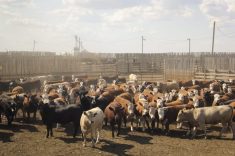A plan to stall any uninvited takeover bid for Maple Leaf Foods by attaching a “poison pill” plan to its shares has raised the ire of one of the company’s biggest shareholders.
The Ontario Teachers’ Pension Plan last week said it opposes the plan as adopted by Maple Leaf’s board of directors and would vote against it if it’s put to a shareholder vote.
“In the meantime, we are considering all other options open to us with respect to challenging the adoption of this rights plan, which prevents us from exercising our legal rights as shareholders,” Neil Petroff, Teachers’ executive vice-president of investments, said in a release.
Read Also

U.S. livestock: Cattle fall back as inventory hits 75-year low
Most Chicago Mercantile Exchange cattle futures fell on Friday. Lean hog contracts also dipped. Most-traded April live cattle futures settled…
The Toronto-based food and meat processor emphasized June 29 that the pill plan — usually referred to by a company that adopts it as a “shareholder rights plan” — is not a response to any “actual or anticipated transaction.”
But it also stands to make a large stake, like the one-third of Maple Leaf owned by Teachers, less appetizing to any uninvited buyer.
A poison pill, if triggered by an unasked-for takeover bid, automatically floods the market with cut-price shares that are offered to every shareholder other than the unsolicited bidder, thus diluting the unasked-for bidder’s stake.
In Maple Leaf’s case, the company would “swallow” its pill by issuing new shares at a 50 per cent discount from the publicly traded share price, when or if any unsolicited shareholder buys up more than 20 per cent of Maple Leaf’s publicly traded shares.
Maple Leaf’s new plan stipulates that neither of its two biggest shareholders, Teachers and McCain Capital, would trigger the poison pill, as long as neither moves to increase its ownership stake, unless it’s through the board’s “permitted bid” option.
Petroff said Teachers is “also considering all of our options with respect to (its Maple Leaf) shareholdings.”
The pension fund, Canada’s biggest single-profession pension plan, announced it will convert 11.7 million of its non-voting common shares in Maple Leaf to voting shares.
That, along with its other voting shares, warrants exercisable into 2.19 million voting shares, and another 10.3 million non-voting shares, beneficially gives Teachers 36.27 per cent of Maple Leaf’s voting stock.
Teachers also noted that before the Maple Leaf board adopted its poison pill, the pension fund had entered into a voting agreement with another shareholder, Sixmoront Corp., in respect of the voting of common shares.
Teachers also noted last week that it “has entered into an understanding with (Maple Leaf) as to the basis upon which any secondary offering by Teachers would be completed.”














